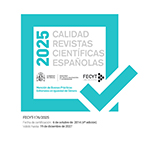Elementos de la competencia intercultural: un análisis documental de la política educativa supranacional de la Unión Europea
Resumen
El escenario sociopolítico en la Unión Europea ha cambiado, entre otros factores, por la globalización, la ciudadanía europea y las migraciones. Ante esta situación, los ciudadanos europeos requieren nuevas competencias para vivir en sociedades cada vez más plurales. Por estos motivos, este artículo persigue analizar la política educativa vigente de la Unión Europea con respecto a la educación intercultural y, además, identificar los elementos que conforman la competencia intercultural en el marco europeo. La metodología empleada para desarrollar esta investigación mixta ha sido el Análisis Documental. Las unidades de análisis se han obtenido a través de la plataforma EUR-Lex de la Unión Europea. La normativa, compuesta por 81 documentos, hace referencia explícita a la educación intercultural o multicultural y se encuentra en vigor. Posteriormente, realizó un proceso de codificación mediante el software de análisis mixto (cuantitativo-cualitativo) MAXQDA Analytics Pro 2020, donde se atendió a la naturaleza del documento y a los elementos que componen la competencia intercultural en el marco europeo. Los resultados han puesto de manifiesto que el grueso de esta normativa son políticas blandas, principalmente resoluciones, siendo la institución emisora más frecuente el Consejo Europeo. Por otro lado, se han identificado 12 elementos que conforman la competencia intercultural en la política educativa de la Unión Europea, siendo las más recurrentes: el diálogo intercultural; el entendimiento, la comprensión y el respeto mutuo; la ciudadanía y la democracia; la igualdad y la cohesión social; y las expresiones culturales y la creatividad. A modo de conclusión, se ha corroborado que la UE desarrolla su política educativa mayoritariamente mediante políticas blandas y a través del Consejo Europeo. Por último, se ha puesto de manifiesto la estrecha interrelación de los distintos elementos que conforman la competencia intercultural a lo largo de las políticas analizadas.
Descargas
Descarga artículo
Licencia
La Revista Complutense de Educación, para fomentar el intercambio global del conocimiento, facilita el acceso sin restricciones a sus contenidos desde el momento de su publicación en la presente edición electrónica, y por eso es una revista de acceso abierto. Los originales publicados en esta revista son propiedad de la Universidad Complutense de Madrid y es obligatorio citar su procedencia en cualquier reproducción total o parcial. Todos los contenidos se distribuyen bajo una licencia de uso y distribución Creative Commons Reconocimiento 4.0 (CC BY 4.0). Esta circunstancia ha de hacerse constar expresamente de esta forma cuando sea necesario. Puede consultar la versión informativa y el texto legal de la licencia.











